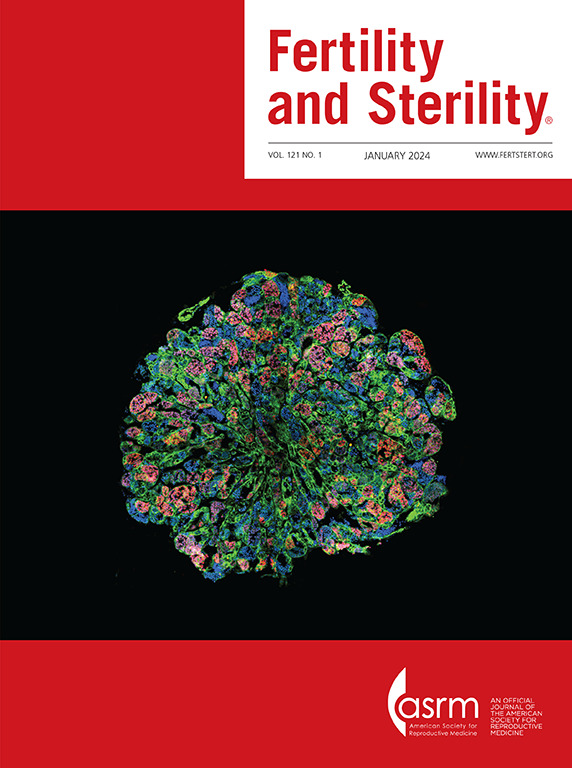使用 hCG 和 FSH 治疗睾酮后精子生成的最佳恢复。
IF 6.6
1区 医学
Q1 OBSTETRICS & GYNECOLOGY
引用次数: 0
摘要
目的研究使用新型生育治疗方案改善曾接受过睾酮治疗的男性的生精功能:设计:单中心回顾性队列分析:研究:单中心回顾性队列分析。研究对象:在2020年1月至2024年3月期间寻求生育治疗的77名曾使用过睾酮的男性:主要结果测量:主要测量结果:hCG/FSH治疗期间精子浓度的变化是主要测量结果。次要结果是在 hCG/FSH 治疗期间同时使用睾酮是否会影响精子生成的恢复:结果:在整个研究组(77 人)中,74% 的男性精子浓度有所提高。在 hCG/FSH 重启期间继续接受睾酮治疗的男性,其精子浓度的恢复情况没有明显差异(不接受睾酮治疗 [n=50],74% 的男性精子浓度有所改善;同时接受睾酮治疗 [n=27],74% 的男性精子浓度有所改善):结论:我们报告了使用hCG/FSH疗法对有睾酮使用史的不育男性精子生成的最佳恢复效果。同时使用睾酮治疗不会阻碍 hCG/FSH 介导的生精功能恢复。本文章由计算机程序翻译,如有差异,请以英文原文为准。
Optimal restoration of spermatogenesis after testosterone therapy using human chorionic gonadotropin and follicle-stimulating hormone
Objective
To study improvements in spermatogenesis in men with a history of testosterone therapy using a novel fertility treatment regimen.
Design
A single-center retrospective cohort analysis.
Subjects
Seventy-seven men with previous testosterone use seeking fertility treatment from January 2020 to March 2024.
Exposure
A treatment regimen of 3,000 IU of human chorionic gonadotropin (hCG) and 75 IU of follicle-stimulating hormone (FSH) three times a week was used.
Main Outcome Measures
The primary outcome measured was change in sperm concentration during hCG/FSH therapy. The secondary outcome measured was whether concurrent testosterone therapy during hCG/FSH therapy affected recovery of spermatogenesis.
Results
Within the entire cohort (n = 77), 74% of men demonstrated improvements in their sperm concentrations. There was not a significant difference in recovery of sperm concentration in men who stayed on testosterone therapy during hCG/FSH reboot (no testosterone therapy [n = 50], 74% improved, vs. concurrent testosterone therapy [n = 27], 74% improved).
Conclusion
We report optimal recovery of spermatogenesis with hCG/FSH therapy in men with infertility with a history of testosterone use. Concurrent testosterone therapy does not impede hCG/FSH-mediated spermatogenic recovery.
Restauración óptima de la espermatogénesis después del tratamiento con testosterona usando gonadotropina coriónica humana y hormona folículo estimulante
Objetivo
Estudiar las mejoras en la espermatogénesis en hombres con antecedentes de tratamiento con testosterona utilizando un nuevo régimen de tratamiento de fertilidad.
Diseño
Análisis de cohorte retrospectivo de un solo centro.
Sujetos
Setenta y siete hombres con uso previo de testosterona que buscaron tratamiento de fertilidad desde enero de 2020 hasta marzo de 2024.
Exposición
Se utilizó un régimen de tratamiento de 3000 UI de gonadotropina coriónica humana (hCG) y 75 UI de hormona folículo estimulante (FSH) tres veces por semana.
Principales medidas de resultados
El resultado primario medido fue el cambio en la concentración de espermatozoides durante el tratamiento con hCG/FSH. El resultado secundario medido fue si el tratamiento con testosterona concurrente durante la terapia con hCG/FSH afectó la recuperación de la espermatogénesis.
Resultados
En toda la cohorte (n = 77), el 74 % de los hombres demostraron mejoras en sus concentraciones de esperma. No hubo una diferencia significativa en la recuperación de la concentración de esperma en los hombres que continuaron con el tratamiento con testosterona durante el reinicio de hCG/FSH (sin terapia de testosterona [n = 50], 74 % mejoró, frente al tratamento con testosterona concurrente [n = 27], 74 % mejoró).
Conclusión
Informamos de una recuperación óptima de la espermatogénesis con el tratamiento con hCG/FSH en hombres con infertilidad con antecedentes de uso de testosterona. El tratamiento concurrente con testosterona no impide la recuperación espermatogénica mediada por hCG/FSH.
求助全文
通过发布文献求助,成功后即可免费获取论文全文。
去求助
来源期刊

Fertility and sterility
医学-妇产科学
CiteScore
11.30
自引率
6.00%
发文量
1446
审稿时长
31 days
期刊介绍:
Fertility and Sterility® is an international journal for obstetricians, gynecologists, reproductive endocrinologists, urologists, basic scientists and others who treat and investigate problems of infertility and human reproductive disorders. The journal publishes juried original scientific articles in clinical and laboratory research relevant to reproductive endocrinology, urology, andrology, physiology, immunology, genetics, contraception, and menopause. Fertility and Sterility® encourages and supports meaningful basic and clinical research, and facilitates and promotes excellence in professional education, in the field of reproductive medicine.
 求助内容:
求助内容: 应助结果提醒方式:
应助结果提醒方式:


